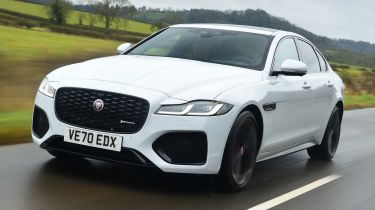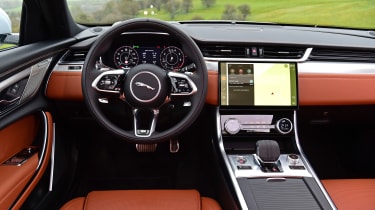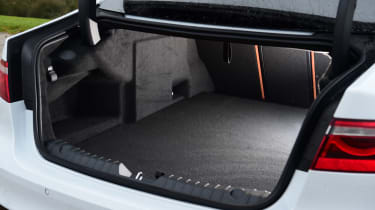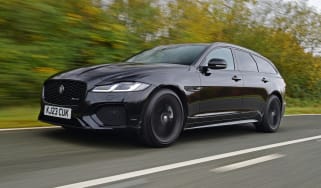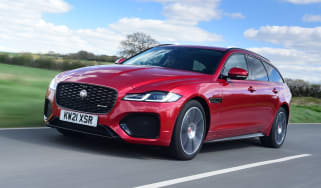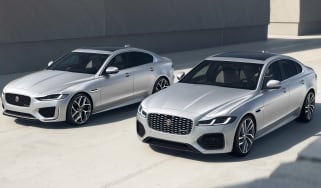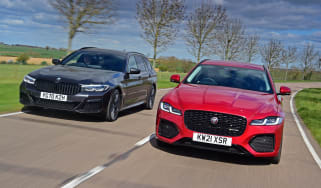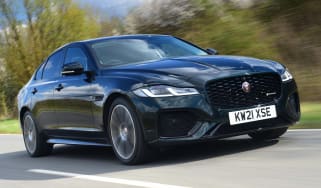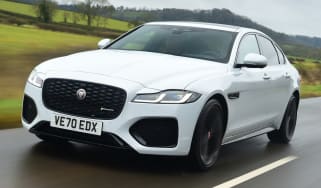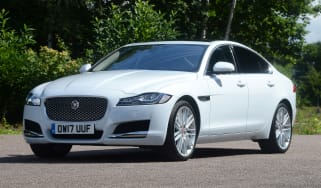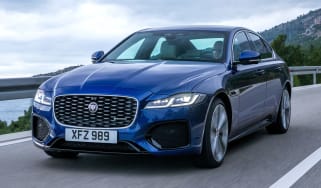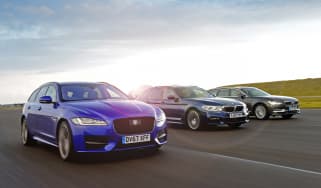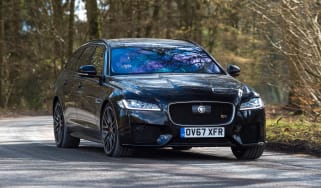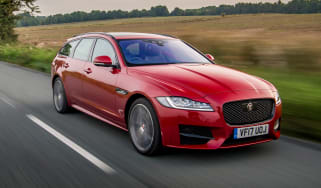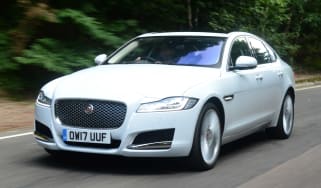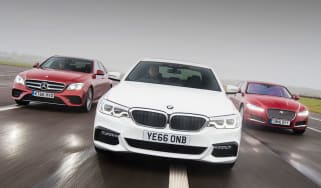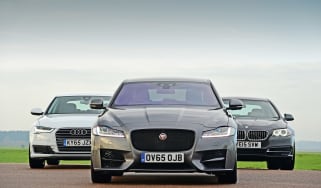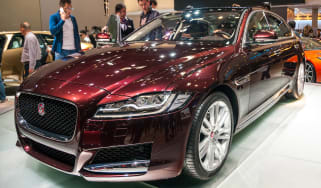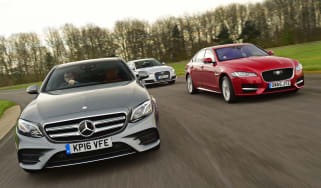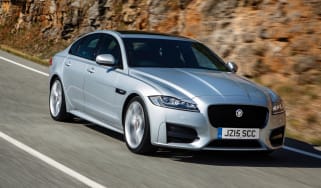Jaguar XF review
Jaguar's latest XF is desirable and very good to drive, making it a genuine rival to the German alternatives

Jaguar has borrowed much of what makes the smaller XE such a desirable compact executive car to make the XF saloon comfortable, refined and good to drive.
Lightweight aluminium construction and a range of efficient engines help the XF deliver decent but not brilliant running costs for company car users, while the car benefits from Jaguar's proven handling know-how to deliver a composed and engaging driving experience.
Sharp styling, a strong range of engines and an engaging chassis mean the XF is well worth considering as an alternative to its German rivals. A facelift in 2020 brought a fresh exterior look, while upgrades to interior trim and on-board tech ensure the XF is ready to do battle with the best executive saloons on the market.
The Jaguar XF that arrived in 2007 was the first car for sale in Jaguar dealers that saw the British company move away from the retro looks of past models to a new, more modern appearance. The first XF saloon, as well as the XF Sportbrake estate and high-performance XFR, was replaced by the XF Mk2 in 2015. It maintained the original car's luxury, but offered a sharper look and greater efficiency.
As with the original car, the XF is for sale as a four-door saloon or XF Sportbrake estate. Jaguar has streamlined its engine lineup to include a 201bhp 2.0-litre diesel with mild-hybrid technology, along with a 2.0-litre petrol unit in two states of tune: the P250 delivering 247bhp via the rear wheels and the P300 with 296bhp and an all-wheel-drive set-up. The oil burner is available as either a rear-wheel or all-wheel-drive version.
Used - available now

2017 Vauxhall
Corsa
64,896 milesManualPetrol1.4L
Cash £5,295
2015 Volvo
XC60
148,809 milesManualDiesel2.0L
Cash £6,495
2016 Peugeot
308
51,200 milesManualPetrol1.2L
Cash £6,195
2018 SsangYong
Tivoli
69,204 milesManualPetrol1.6L
Cash £4,695Prices for the XF start from around £32,500 for the saloon, with the XF Sportbrake costing around £2,000 extra.
Chief opponents for the XF are the Audi A6, BMW 5 Series and Mercedes E-Class, although the Volvo S90 majors on comfort, while the Lexus ES has replaced the GS in the Japanese line-up and the Maserati Ghibli is a leftfield choice if you want something sporty. If you're a company car buyer, then perhaps a Tesla Model S could be considered as a rival, too.
Back to the XF and, as with the engine range, Jaguar has decided on a reduced list of available trim levels. The rear-wheel-drive cars feature an entry-level S equipment level, while R-Dynamic S, R-Dynamic SE and R-Dynamic HSE make up the rest of the equipment options.
Engines, performance and drive
Thanks to its aluminium underpinnings, the XF is relatively light compared to its rivals, which helps the way it rides and handles. The suspension keeps the body tied down nicely during cornering, so there’s plenty of composure – but there’s also lots of comfort on offer, as the XF boasts that typically plush ride quality big Jags have always possessed.
Show the XF a twisty road, and the fast steering means the car is eager to tackle bends. The car turns in sharply and while it can feel over-alert at times, we prefer this responsive nature to sluggish, relaxed steering. AWD versions strike a good balance between keeping the tidy rear-wheel drive feeling to the handling and adding lots of grip for poor conditions.
In Dynamic mode the car feels tauter and more alive, responding to direction changes quickly and cornering flatter. But in Comfort the ride quality is good, even on big wheels, and the dampers filter out most lumps and bumps, with only serious road imperfections being felt inside the car.
Engines, 0-60 acceleration and top speed
As many XF buyers will be business users, CO2 emissions are vitally important in this sector – which is why Jaguar opted to go almost exclusively for diesel when it launched the second generation model, although more petrol options became available over time.
The manufacturer now includes just a single 2.0-litre diesel engine, although it does feature mild-hybrid tech to help reduce CO2 emissions and boost fuel economy. The rear-wheel-drive D200 version manages the sprint from 0-62mph in 7.6s, with the all-wheel drive car two tenths slower to the same mark. Both are capable of a top speed of 143mph.
Customers choosing either the P250 or P300 petrol variants will benefit from improved performance: the former posting a 6.9s dash to 62mph and the latter a hot-hatch rivalling 6.1s, with both going on to a maximum speed of 155mph.
MPG, CO2 and running costs
If you’re after a CO2 champion, then you need to look elsewhere in the executive saloon market, as the XF doesn't fare particularly well.
Jaguar has attempted to address the economy shortfalls of the XF by introducing mild-hybrid tech for its 2.0-litre diesel engine. It certainly goes someway to making running costs more competitive, but a plug-in hybrid such as the BMW 530e or Mercedes E300 e, although costing more to buy, will offer vastly superior economy and lower CO2 emissions.
The XF D200, in rear-wheel-drive form, manages a decent 57.2mpg while emitting 130g/km. Opting for the benefits of four-wheel-drive results in a slightly less-efficient car: Jaguar claims a maximum 51.8mpg and 143g/km of CO2.
Entry-level petrol power sees the P250 delivering 35.2mpg with 181g/km of CO2, while the top-of-the-range P300 offers 32.9mpg and emissions of 193g/km.
Following the streamlining of the XF range, Jaguar has managed to reduce the starting price by almost £2,500, so you'll be able to bag the D200 S version for just over £32,500.
Insurance groups
Insurance premiums should be on a par with rivals, although with the entry D200 S diesel model sitting in group 34, comprehensive cover won't be cheap. The top R-Dynamic HSE trim pushes the D200 car into group 36.
The P250 S petrol version also occupies group 36, while the P300 R-Dynamic HSE is in group 39.
Depreciation
Our data suggests the facelifted XF will perform better than the previous model on the used market. Residual values should range from 43-49% after a typical three-year/36,000-mile ownership period, which is more aligned with the XF's German rivals.
To get an accurate valuation on a specific model check out our free car valuation tool...
Interior, design and technology
As before, the XF is offered in both saloon and estate-bodied Sportbrake shapes. Following the model facelift in 2020, both versions get a revised rear bumper, while the saloon features smoked tail lights.
Other exterior changes are equally subtle: the front gets a new bumper design, which features deeper, wider vents, a reprofiled grille with a new insert and LED headlights as standard.
All cars are well equipped with standard kit including 18-inch alloy wheels, a powered boot, rain-sensing wipers, dual-zone climate control, leather upholstery, heated front seats and front and rear parking sensors.
Moving through the range brings bigger alloy wheels, an automatic high-beam function, keyless entry, adaptive cruise control and an upgraded audio system.
Sat-nav, stereo and infotainment
Jaguar engineers and designers have clearly spent most of their time creating a truly fresh interior for the XF.
The cabin includes a totally redesigned centre console, with a new 11.4-inch curved glass touchscreen taking pride of place. The screen controls Jaguar’s Pivi Pro infotainment system, which features sharper graphics and a more polished, user-friendly interface, which now adds most key navigation, climate and audio functions onto the main display.
Apple CarPlay and Android Auto are both standard, while a 400W Meridian audio system is offered with the HSE trim level.
Practicality, comfort and boot space
The XF’s impressive usability stems from its improved rear access and legroom, because despite the low roofline it’s easy to climb into the back. There’s acres of space once you’re in there, so even taller adults should be comfortable on longer journeys. Comfortable seats mean it’s easy to while away the miles, helping you feel fresh when you reach your destination.
Dimensions and size
The XF is 1.88 metres wide, and the BMW 5 Series and Mercedes E-Class have narrower dimensions. It means there’s plenty of width in the back, so space across the rear bench should accommodate three adults for shorter trips.
It’s also slightly longer than its German counterparts, and slightly higher too. However, the narrow window opening and flowing roofline helps to elongate the car’s elegant shape, making it look lower and longer than it is. A sensible ride height makes it easy to get in and out of.
Leg room, head room & passenger space
Despite the tapering roofline towards the rear of the car, there’s ample headroom in the back, and with a large wheelbase, passenger space inside is maximised.
Boot space
At 540 litres, the XF boasts a bigger boot than the BMW 5 Series (520 litres) and the Audi A6 (530 litres). It’s a good shape, too, so should take nearly everything a company car driver or family can throw at it.
But if you need even more space, Jaguar offers a split-folding 40:20:40 rear seat as an option, which increases luggage room to 963 litres. Plus this configuration, with a foldable middle seat, helps accommodate long loads.
Towing
Petrol versions are able to tow a maximum 1,900kg, while the diesel XF models are rated at 2,000kg.
Reliability and safety
Jaguar is a consistently better performer than Audi, BMW or Mercedes in our Driver Power customer satisfaction survey.
In the 2020 poll, Jaguar again trounced its premium rivals by finishing a solid 12th out of 30 manufacturers, while the pre-facelift XF placed a credible 47th out of 100 cars.
There’s lots of safety kit as standard in the XF. Even the entry-level Prestige model comes fitted with lane departure warning and autonomous braking - these are options on the Audi A6 or BMW 5 Series. In the 2015 round of Euro NCAP crash testing, this kit and the solid body shell helped the XF earn a full five-star safety rating.
Warranty
The XF comes with a three-year/unlimited mileage warranty, which is standard for the sector, although Audi's similar cover has a 60,000-mile distance limit. There’s also three years’ roadside assistance with Jag's policy, so if the car should break down inside the standard warranty period, you’ll be recovered without quibble.
Servicing
Jaguar offers interest-free payment options for when you need to service your XF. You can opt to spread payment over a month, or equal installments over 3, 6 or 9 months.
